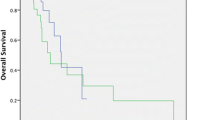Abstract
Transforming growth factor-beta1 (TGF-beta1) plays an important role in the pathogenesis of multiple malignancies, and also, its expression strongly affects the outcomes of cancer patients. The objective of this study was to determine the clinical significance of the serum levels of TGF-beta1 in gastric cancer patients. A total of 63 patients with a pathologically confirmed diagnosis of gastric cancer were enrolled into this study. Serum TGF-beta1 concentrations were determined by the solid-phase sandwich ELISA method. Thirty healthy age- and sex-matched controls were included in the analysis. The median age at diagnosis was 62 years, range 28 to 82 years. There was no significant difference in baseline serum TGF-beta1 levels between gastric cancer patients and the healthy control group (p = 0.08). The known clinical variables including age of patient, gender, site of lesion, histology, histological grade, stage of disease, and serum levels of lactate dehydrogenase (LDH), CEA, and carbohydrate antigen (CA) 19.9 were not found to be correlated with serum TGF-beta1 concentrations (p > 0.05). However, the chemotherapy-responsive patients had higher serum TGF-beta1 levels compared with chemotherapy-unresponsive ones (median values 330.50 v 49.54 pg/mL, respectively, p = 0.01). Moreover, patients with elevated serum TGF-beta1 concentrations had significantly favorable overall survival compared with those with lower levels (median 71.1 v 39.9 weeks, respectively, p = 0.04). In conclusion, serum levels of TGF-beta1 may have predictive and prognostic roles in patients with gastric cancer.

Similar content being viewed by others
References
Vagenas K, Spyropoulos C, Gavala V, Tsamandas AC. TGFbeta1, TGFbeta2, and TGFbeta3 protein expression in gastric carcinomas: correlation with prognostic factors and patient survival. J Surg Res. 2007;139:182–8.
Ananiev J, Gulubova M, Tchernev G, Penkova M, Miteva R, Julianov A, et al. Relation between transforming growth factor-β1 expression, its receptor and clinicopathological factors and survival in HER-2 negative gastric cancers. Wien Klin Wochenschr. 2011;123:668–73.
Saito H, Tsujitani S, Oka S, Kondo A, Ikeguchi M, Maeta M, et al. The expression of transforming growth factor-1 is significantly correlated with the expression of vascular endothelial growth factor and poor prognosis of patients with advanced gastric carcinoma. Cancer. 1999;86:1455–62.
Hawinkels LJ, Verspaget HW, van Duijn W, van der Zon JM, Zuidwijk K, Kubben FJ, et al. Tissue level, activation and cellular localization of TGF-beta1 and association with survival in gastric cancer patients. Br J Cancer. 2007;97:398–404.
Kim JY, Jeon TJ, Bae BN, Kwon JE, Kim HJ, Park K, et al. The prognostic significance of growth factors and growth factor receptors in gastric adenocarcinoma. APMIS. 2012;121:95–104.
Maehara Y, Kakeji Y, Habashima A, Emi Y, Watanabe A, Akazawa K, et al. Role of transforming growth factor-β in invasion and metastasis in gastric carcinoma. J Clin Oncol. 1999;17:607–14.
Ma GF, Miao Q, Zeng XQ, Luo TC, Ma LL, Liu YM, et al. Transforming growth factor-β1 and -β2 in gastric precancer and cancer and roles in tumor-cell interactions with peripheral blood mononuclear cells in vitro. PLoS One. 2013;8:e54249.
Suda A, Saito N, Seshimo A, Kameoka S, Kobayashi M. Examination of transforming growth factor beta1 expression in the serum and tumor tissue of gastric cancer. Int Surg. 2009;94:182–8.
Saito H, Tsujitani S, Oka S, Kondo A, Ikeguchi M, Maeta M, et al. An elevated serum level of transforming growth factor-beta 1 (TGF-beta 1) significantly correlated with lymph node metastasis and poor prognosis in patients with gastric carcinoma. Anticancer Res. 2000;20:4489–93.
Niki M, Okajima K, Isozaki H, Toyoda M, Ichinona T, Nomura E, et al. Measurement of the plasma transforming growth factor-beta 1(TGF-beta 1) level in patients of gastric carcinoma-compared with the serum IAP level and the lymphocyte subsets (CD3, CD4, CD8). Nippon Shokakibyo Gakkai Zasshi. 1996;93:303–11.
Coban S, Yuksel O, Kockar MC, Koklu S, Basar O, Tutkak H, et al. The significance of serum transforming growth factor beta 1 in detecting of gastric and colon cancers. Hepatogastroenterology. 2007;54:1472–6.
Lin Y, Kikuchi S, Obata Y, Yagyu K. Serum levels of transforming growth factor β1 are significantly correlated with venous invasion in patients with gastric cancer. J Gastroenterol Hepatol. 2006;21:432–7.
Li X, Yue ZC, Zhang YY, Bai J, Meng X, Geng JS, et al. Elevated serum level and gene polymorphisms of TGF-β1 in gastric cancer. J Clin Lab Anal. 2008;22:164–71.
Yatsuya H, Toyoshima H, Tamakoshi K, Tamakoshi A, Kondo T, Hayakawa N, et al. Serum levels of insulin-like growth factor I, II, and binding protein 3, transforming growth factor beta-1, soluble fas ligand and superoxide dismutase activity in stomach cancer cases and their controls in the JACC Study. J Epidemiol. 2005;15 Suppl 2:S120–5.
Conflicts of interest
None
Role of the funding source
None
Author information
Authors and Affiliations
Corresponding author
Rights and permissions
About this article
Cite this article
Tas, F., Yasasever, C.T., Karabulut, S. et al. Serum transforming growth factor-beta1 levels may have predictive and prognostic roles in patients with gastric cancer. Tumor Biol. 36, 2097–2103 (2015). https://doi.org/10.1007/s13277-014-2817-9
Received:
Accepted:
Published:
Issue Date:
DOI: https://doi.org/10.1007/s13277-014-2817-9




